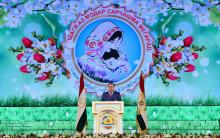STATE POLICY IN THE DIRECTION OF ENHANCING THE STATUS AND ROLE OF WOMEN IN SOCIETY
The Government of the country shows special respect for women and, in a number of State programs, strategies and concepts, emphasizes the promising potential of women's activities and their role in leadership, strengthening statehood, public health and family stability.
Emomali Rahmon
In the social policy of the state and the Government of the Republic of Tajikistan, serious attention is paid to raising the status and role of women in society, expanding their social and labor activities, strengthening their social and political status, and promoting their leadership. The legal basis for this policy is the Constitution of the Republic of Tajikistan, other normative and legal acts and international legal instruments recognized by Tajikistan. Among the countries of the Commonwealth of Independent States, Tajikistan was one of the first to adopt international conventions on the abolition of all forms of oppression of women (Supreme Council Decision №831 June 26, 1993) and on the political rights of women (Supreme Court Council Decision №769 May 14, 1999).
After the adoption of Presidential Decree №5 from December 3rd, 1999 "On measures to enhance the status of women in society", a number of normative legal acts were adopted, such as the Law of the Republic of Tajikistan "On state guarantees of equal rights of men and women and equal opportunities for their realization", the National strategy for the activation of the role of women in the Republic of Tajikistan in two stages (for 2011-2020 and 2021-2030), the State program for the training, selection and placement of executive personnel from the talented girls and women of the Republic of Tajikistan was adopted in 3 stages (for 2007-2016, 2017-2022 and 2023-2030) and is being implemented.
That is why presidential quotas have been implemented to support talented girls and attract them to education, and from 1997 to 2021, 13,384 girls entered higher vocational education institutions in Tajikistan under the quota. At the same time, the introduction of scholarships and stipends for girls, the establishment of a center for orphaned girls, and support for safe motherhood and women's health have played an important role in activating the role of women in society.
According to the results of the 2020 elections, 8 women, or 25.8 percent, were elected to Majlisi Milli of Majlisi Oli, and 15 women, or 23.8 percent, were elected to Majlisi Namoyandagon, which is almost 4 percent more than in the previous elections.
The number of women in the assemblies of people's deputies of Dushanbe city reached 41.5 percent, in Khatlon province - almost 35 percent, in Sughd province - more than 33 percent, in Badakhshon Mountain Autonomous Province - more than 34 percent, and in the cities and districts of the republic - almost 30 per cent.
Women's contribution to the development of science, education and health care in the country is increasing. According to statistics, in 1991, only 52% of the 95,000 employees in the country's education sector were women and girls. In 2022, this figure will reach 73%. Women also account for 71 percent of health care, 47 percent of culture, 39 percent of banking, and 25 percent of communications, including almost 40 percent of information services.
From the above analysis we can conclude that in the Republic of Tajikistan, increasing the status and role of women in society is at the center of the rational policy of the state, especially the founder of national peace and unity - the leader of the nation, President of the Republic of Tajikistan his Excellency Emomali Rahmon, who seeks to realize the rights and opportunities of women, the necessary conditions have been created.
mmk.tj
translated Ismoilov R.

